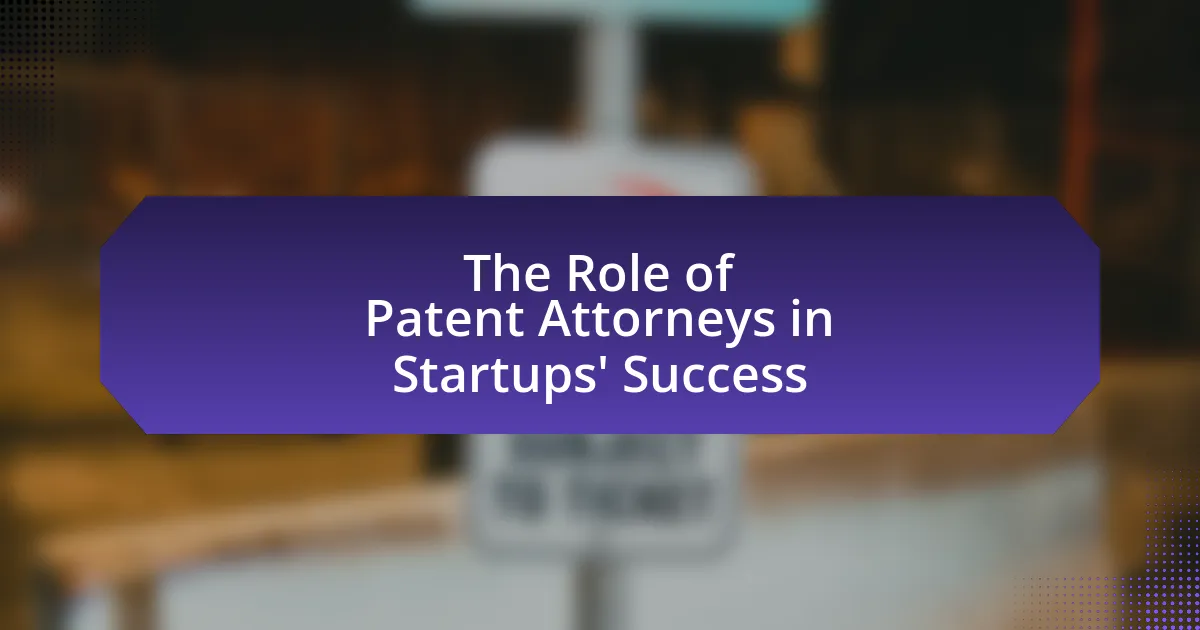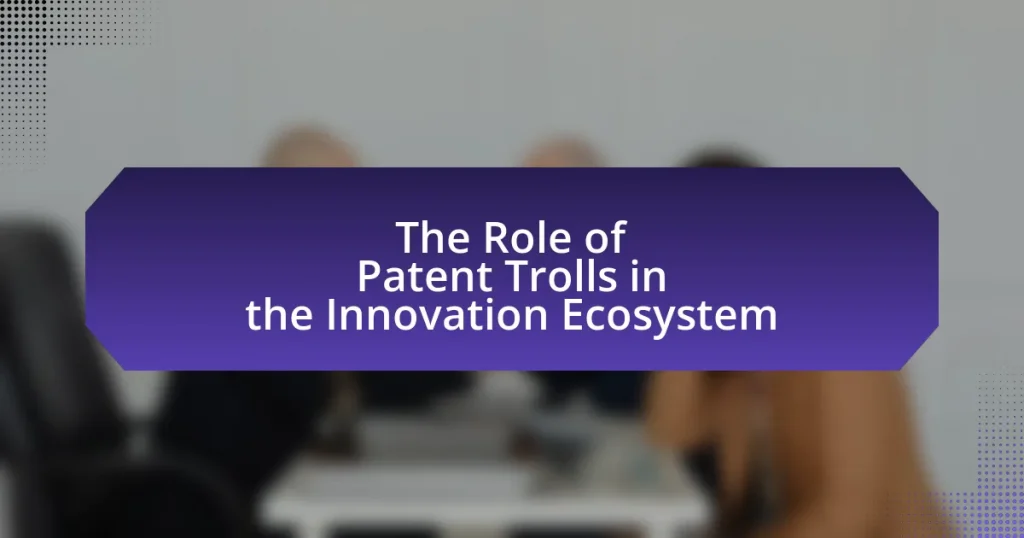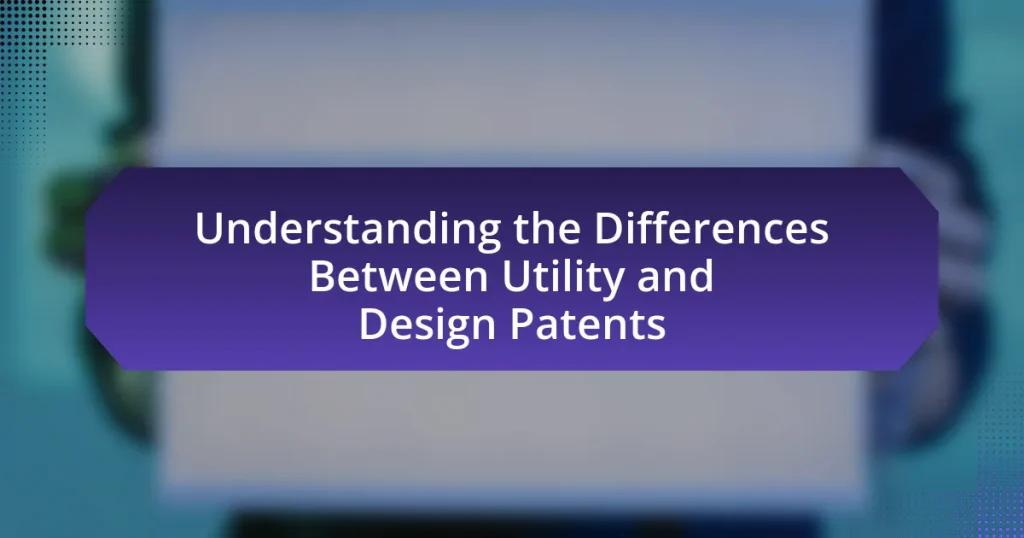Patent attorneys are essential to the success of startups, providing critical legal expertise in intellectual property protection. They assist in securing patents, which safeguard innovative ideas and enhance competitive advantage, ultimately attracting investors and increasing company valuation. The article outlines the specific services offered by patent attorneys, including patent application preparation, compliance with patent laws, and strategies for defending against infringement claims. It emphasizes the importance of early engagement with patent attorneys to establish a robust intellectual property portfolio and discusses emerging trends in patent law that startups should be aware of to navigate the complexities of the evolving legal landscape.
What is the Role of Patent Attorneys in Startups’ Success?
Patent attorneys play a crucial role in the success of startups by providing legal expertise in intellectual property protection. They assist startups in securing patents, which can safeguard innovative ideas and technologies, thereby enhancing the company’s competitive edge. According to the United States Patent and Trademark Office, startups that hold patents are more likely to attract investors, as patents can significantly increase a company’s valuation. Furthermore, patent attorneys help navigate complex legal frameworks, ensuring compliance and minimizing the risk of infringement, which is vital for a startup’s sustainability and growth.
How do patent attorneys contribute to the overall success of startups?
Patent attorneys significantly contribute to the overall success of startups by securing intellectual property rights, which protect innovations and enhance competitive advantage. By navigating the complex patent application process, patent attorneys ensure that startups can safeguard their inventions from infringement, thereby increasing their market value and attracting investors. According to the United States Patent and Trademark Office, startups that hold patents are more likely to receive funding, as patents serve as tangible assets that demonstrate innovation and potential for profitability. This legal protection not only fosters a secure environment for growth but also encourages further investment in research and development, ultimately driving the startup’s success.
What specific services do patent attorneys provide to startups?
Patent attorneys provide startups with services including patent application preparation, filing, and prosecution, as well as conducting patent searches and providing legal opinions on patentability. These services are crucial for startups to protect their intellectual property and navigate the complexities of patent law. For instance, according to the United States Patent and Trademark Office, a well-prepared patent application can significantly increase the chances of approval, which underscores the importance of professional assistance in this process. Additionally, patent attorneys help startups in enforcing their patent rights and negotiating licensing agreements, which can be vital for monetizing their innovations.
How do patent attorneys help in protecting intellectual property?
Patent attorneys help in protecting intellectual property by providing legal expertise in the patent application process and ensuring that inventions are properly documented and defended. They assist inventors in drafting patent applications that meet legal requirements, conduct thorough prior art searches to assess the novelty of inventions, and represent clients in patent prosecution before the United States Patent and Trademark Office or equivalent bodies. According to the United States Patent and Trademark Office, a well-prepared patent application increases the likelihood of approval, thereby securing exclusive rights for the inventor. This legal protection is crucial for startups, as it enables them to safeguard their innovations from infringement and enhances their market position.
Why is it important for startups to engage patent attorneys early on?
Engaging patent attorneys early on is crucial for startups to secure their intellectual property and navigate complex patent laws effectively. By involving patent attorneys from the outset, startups can identify patentable innovations, avoid potential infringement issues, and develop a robust patent strategy that aligns with their business goals. Early engagement helps in establishing a strong intellectual property portfolio, which can enhance the startup’s valuation and attract investors. According to the United States Patent and Trademark Office, startups that protect their innovations through patents are more likely to succeed in competitive markets, as patents can provide a competitive edge and facilitate partnerships.
What risks do startups face without legal patent guidance?
Startups face significant risks without legal patent guidance, including the potential for intellectual property theft, costly litigation, and loss of competitive advantage. Without proper patent protection, startups may inadvertently infringe on existing patents, leading to legal disputes that can drain financial resources and divert focus from business development. Additionally, the absence of legal guidance can result in inadequate patent filings, leaving innovations unprotected and vulnerable to competitors. According to a study by the National Bureau of Economic Research, startups that secure patents are 50% more likely to attract venture capital funding, highlighting the importance of legal patent guidance in securing financial support and fostering growth.
How can early patent protection influence investor confidence?
Early patent protection significantly enhances investor confidence by demonstrating a startup’s commitment to safeguarding its intellectual property. This proactive approach signals to investors that the startup has a viable and innovative product or technology, which can lead to a competitive advantage in the market. According to a study published in the Journal of Business Venturing, startups with patents are perceived as less risky investments, as patents provide a legal framework that can deter competitors and potentially increase market share. Furthermore, early patent filings can attract additional funding, as investors often view patent protection as a critical factor in the long-term success and sustainability of a business.
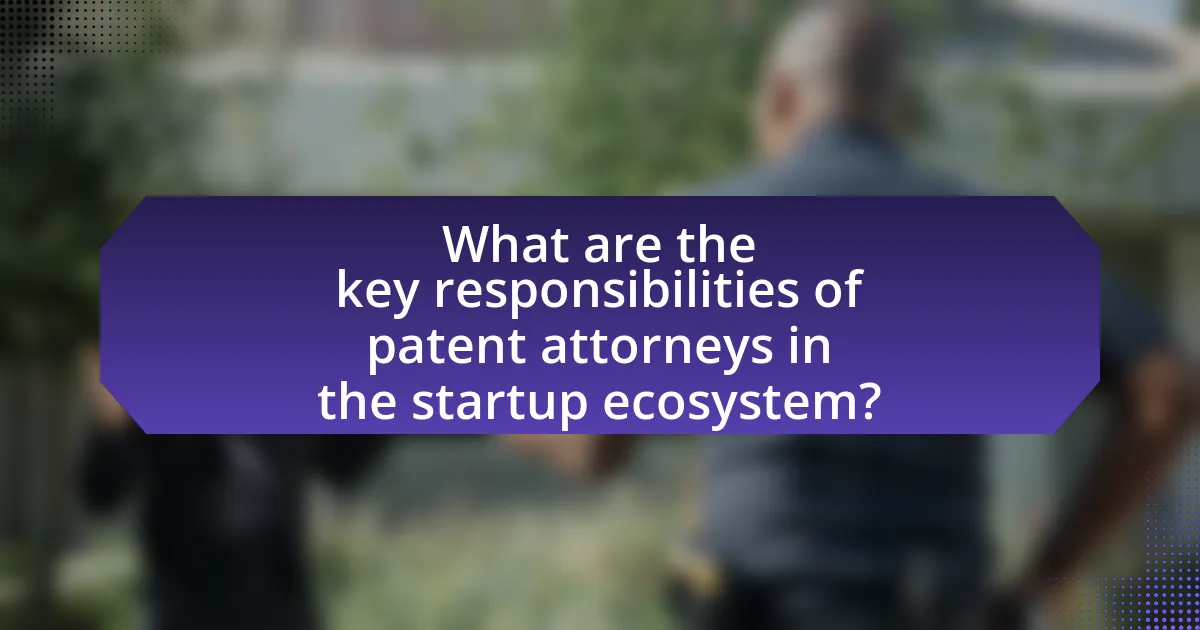
What are the key responsibilities of patent attorneys in the startup ecosystem?
Patent attorneys in the startup ecosystem primarily focus on securing and protecting intellectual property rights for innovative ideas and inventions. They conduct patent searches to assess the novelty of inventions, prepare and file patent applications, and provide legal advice on patent strategy to ensure startups can effectively navigate the complexities of intellectual property law. Additionally, patent attorneys assist in enforcing patent rights and defending against infringement claims, which is crucial for maintaining a competitive edge in the market. Their expertise helps startups avoid costly legal pitfalls and fosters an environment conducive to innovation and growth.
How do patent attorneys assist in the patent application process?
Patent attorneys assist in the patent application process by providing expert guidance on the preparation and submission of patent applications. They conduct thorough prior art searches to assess the novelty of an invention, ensuring that the application meets legal requirements. Additionally, patent attorneys draft claims that define the scope of protection, which is critical for the patent’s enforceability. They also navigate the complexities of patent law, respond to office actions from patent offices, and represent clients in appeals if necessary. Their expertise significantly increases the likelihood of a successful patent grant, as evidenced by the fact that applications prepared by professionals are more likely to be approved compared to those submitted without legal assistance.
What steps are involved in filing a patent application?
The steps involved in filing a patent application include conducting a patent search, preparing the application, filing the application with the relevant patent office, and responding to any office actions. Conducting a patent search helps determine if the invention is novel and non-obvious, which are key criteria for patentability. Preparing the application involves drafting claims, descriptions, and drawings that clearly outline the invention. Filing the application with the patent office initiates the examination process, and responding to office actions addresses any objections or rejections raised by the patent examiner. These steps are essential to securing patent protection and are often guided by patent attorneys to ensure compliance with legal requirements.
How do patent attorneys ensure compliance with patent laws?
Patent attorneys ensure compliance with patent laws by conducting thorough patent searches, drafting precise patent applications, and providing legal advice on patentability and infringement issues. They analyze existing patents to determine the novelty of an invention, ensuring that applications meet the legal requirements set by patent offices. Additionally, patent attorneys stay updated on changes in patent law and regulations, which is crucial for advising clients accurately. Their expertise helps startups navigate complex legal landscapes, reducing the risk of litigation and enhancing the likelihood of successful patent grants.
What role do patent attorneys play in patent litigation?
Patent attorneys play a crucial role in patent litigation by providing legal expertise in the enforcement and defense of patent rights. They assist clients in navigating complex legal processes, including filing lawsuits, drafting legal documents, and representing clients in court. Their specialized knowledge of patent law enables them to analyze patent validity, infringement issues, and potential defenses, which is essential for formulating effective litigation strategies. Additionally, patent attorneys often engage in settlement negotiations and alternative dispute resolution, helping to resolve conflicts efficiently. Their involvement is vital for startups to protect their intellectual property and ensure their innovations are legally safeguarded during disputes.
How can patent attorneys help startups defend against infringement claims?
Patent attorneys assist startups in defending against infringement claims by providing legal expertise in patent law, conducting thorough patent searches, and crafting robust legal strategies. They analyze existing patents to identify potential conflicts and advise startups on how to navigate these issues effectively. For instance, a study by the American Intellectual Property Law Association indicates that startups with legal representation are 50% more likely to successfully defend against infringement claims. This demonstrates the critical role patent attorneys play in safeguarding a startup’s intellectual property and ensuring compliance with patent regulations.
What strategies do patent attorneys use to resolve disputes?
Patent attorneys use negotiation, mediation, and litigation as primary strategies to resolve disputes. Negotiation involves direct discussions between parties to reach a mutually acceptable agreement, often focusing on settlement terms that avoid lengthy legal battles. Mediation introduces a neutral third party to facilitate dialogue and help both sides find common ground, which can lead to a resolution without formal court proceedings. Litigation, when necessary, involves taking the dispute to court, where a judge or jury makes a binding decision based on the evidence presented. These strategies are effective as they allow patent attorneys to tailor their approach based on the specific circumstances of the dispute, aiming to protect their clients’ intellectual property rights while minimizing costs and time associated with legal conflicts.
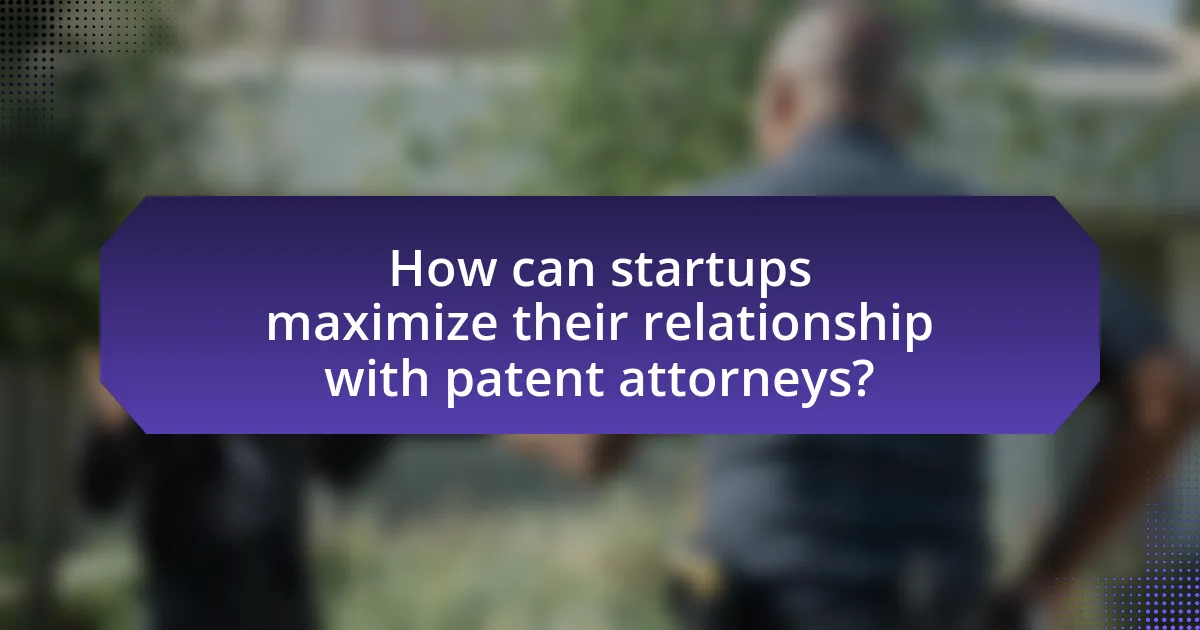
How can startups maximize their relationship with patent attorneys?
Startups can maximize their relationship with patent attorneys by maintaining clear communication and actively involving them in the innovation process. Clear communication ensures that patent attorneys understand the startup’s goals, technology, and market landscape, which is crucial for effective patent strategy. Actively involving patent attorneys from the early stages of product development allows them to identify potential patentable innovations and advise on protecting intellectual property effectively. Research indicates that startups that engage patent attorneys early in the development process are more likely to secure valuable patents, enhancing their competitive advantage in the market.
What best practices should startups follow when working with patent attorneys?
Startups should prioritize clear communication and thorough preparation when working with patent attorneys. Clear communication ensures that the attorney understands the startup’s technology and business goals, which is crucial for effective patent strategy. Thorough preparation involves gathering all relevant documentation and prior art to facilitate the attorney’s work, thereby increasing the chances of successful patent applications. Additionally, startups should seek attorneys with specific experience in their industry, as this expertise can lead to more tailored advice and strategies. According to the United States Patent and Trademark Office, effective collaboration between inventors and patent attorneys significantly enhances the quality of patent applications, leading to higher approval rates.
How can startups effectively communicate their needs to patent attorneys?
Startups can effectively communicate their needs to patent attorneys by clearly outlining their invention’s technical details, business goals, and specific legal requirements. Providing comprehensive documentation, including sketches, prototypes, and market analysis, helps patent attorneys understand the innovation’s context and potential. Additionally, startups should engage in open dialogue, asking questions and seeking clarification on the patent process, which fosters a collaborative relationship. This approach is supported by the fact that effective communication can lead to more tailored legal strategies, ultimately enhancing the startup’s chances of securing valuable intellectual property rights.
What common pitfalls should startups avoid in their dealings with patent attorneys?
Startups should avoid the common pitfall of underestimating the importance of clear communication with patent attorneys. Effective communication ensures that patent attorneys fully understand the startup’s innovations and business goals, which is crucial for drafting strong patent applications. Additionally, startups often make the mistake of not conducting thorough research on potential patent attorneys, leading to misalignment in expertise and expectations. According to a study by the United States Patent and Trademark Office, startups that engage in comprehensive due diligence when selecting patent attorneys are more likely to secure valuable intellectual property rights. Lastly, startups frequently overlook the significance of budgeting for patent-related expenses, which can lead to financial strain and hinder the patent process.
What are the emerging trends in patent law that startups should be aware of?
Emerging trends in patent law that startups should be aware of include increased emphasis on artificial intelligence (AI) in patent applications, changes in patent eligibility criteria, and the rise of international patent strategies. Startups must navigate the complexities of AI-related inventions, as courts are increasingly scrutinizing the patentability of AI-generated innovations. Additionally, recent rulings have shifted the standards for what constitutes a patentable invention, particularly in areas like software and biotechnology, making it crucial for startups to stay informed about these evolving criteria. Furthermore, as globalization continues, startups are recognizing the importance of securing patents in multiple jurisdictions to protect their innovations effectively, leading to a growing trend in international patent filings.
How are changes in technology impacting patent law?
Changes in technology are significantly impacting patent law by necessitating updates to legal frameworks that address new inventions and digital innovations. For instance, the rise of artificial intelligence and biotechnology has led to complex questions regarding patent eligibility, ownership, and enforcement. As a result, patent offices worldwide are revising guidelines to accommodate these advancements, such as the United States Patent and Trademark Office’s (USPTO) efforts to clarify patentability criteria for AI-generated inventions. This evolution in patent law aims to ensure that legal protections keep pace with rapid technological developments, thereby fostering innovation while also addressing challenges like patent thickets and the potential for monopolistic practices in emerging tech sectors.
What future challenges might startups face regarding intellectual property?
Startups may face significant challenges regarding intellectual property, including increased competition, evolving regulations, and the complexity of global IP laws. As the startup ecosystem grows, the likelihood of patent infringement disputes rises, making it essential for startups to navigate existing patents carefully. Furthermore, changes in legislation, such as the implementation of the America Invents Act, have shifted the landscape of patent rights, requiring startups to adapt quickly to maintain their competitive edge. Additionally, the international nature of business today means startups must understand and comply with varying IP laws across different jurisdictions, which can be resource-intensive and complicated. These challenges necessitate the expertise of patent attorneys to help startups protect their innovations effectively and strategically.
What practical tips can startups implement to enhance their patent strategy?
Startups can enhance their patent strategy by conducting thorough prior art searches to identify existing patents and technologies. This process helps startups avoid infringement and refine their innovations. Additionally, engaging a patent attorney early in the development process ensures that the startup’s inventions are properly documented and protected, which is crucial for securing intellectual property rights. Furthermore, startups should prioritize filing provisional patents to establish an early filing date, allowing them to test the market while maintaining patent rights. According to the United States Patent and Trademark Office, provisional patents can provide a cost-effective way to secure a patent pending status for up to one year. Lastly, startups should regularly review and update their patent portfolio to align with their evolving business strategy and market needs, ensuring that their intellectual property remains relevant and valuable.
